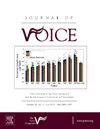Common Mental Disorders and Self-Perceived Interpersonal Communication and Vocal Symptoms in University Professors
IF 2.5
4区 医学
Q1 AUDIOLOGY & SPEECH-LANGUAGE PATHOLOGY
引用次数: 0
Abstract
Objective
To determine the prevalence of common mental disorders in university professors and to analyze the same with sociodemographic and occupational data, self-perceived interpersonal communication, and vocal symptoms.
Methods
A Cross-sectional analytical observational quantitative study with 322 university professors. Four assessment instruments: the Sociodemographic and Work Information Questionnaire, the Self-Report Questionnaire, the Brazilian Dysphonia Screening Tool, the Interpersonal Communication Competence Scale, and the Voice Symptom Scale. The study performed descriptive and association analyses. The measure of association was the prevalence ratio, estimated with Poisson regression with robust invariance, considering common mental disorders as a dependent variable.
Results
The prevalence of common mental disorders in university professors was 27.6%. There was a significant association between such disorders and self-perceived vocal complaints, the suspicion of dysphonia, and self-perceived difficulties in regards to being heard with a mask (sometimes/always). The higher the score in the self-disclosure domain of the Interpersonal Communication Competence Scale the higher the prevalence of common mental disorders in university professors.
Conclusion
The prevalence of common mental disorders in university professors is high and influences their self-perception of vocal symptoms and interpersonal relationships. Hence, it reinforces the need for measures to maintain university professors’ vocal and mental health.
大学教授的常见精神障碍与自我感觉的人际沟通和发声症状。
目的:确定大学教授中常见精神障碍的患病率,并结合社会人口学和职业数据以及自我感觉良好的人际沟通和发声症状进行分析:确定大学教授中常见精神障碍的患病率,并结合社会人口学和职业数据、自我感觉良好的人际沟通以及发声症状对患病率进行分析:方法:对 322 名大学教授进行横断面分析观察定量研究。四种评估工具:社会人口和工作信息问卷、自我报告问卷、巴西发音障碍筛查工具、人际沟通能力量表和嗓音症状量表。研究进行了描述性分析和关联分析。关联性的衡量标准是患病率比值,使用具有稳健不变量的泊松回归进行估算,并将常见精神障碍视为因变量:结果:大学教授中常见精神障碍的患病率为 27.6%。常见精神障碍与自我感觉的声带不适、怀疑发音障碍和自我感觉戴口罩听力困难(有时/总是)之间存在明显联系。人际沟通能力量表中自我披露领域的得分越高,大学教授常见精神障碍的患病率就越高:结论:常见精神障碍在大学教授中的流行率很高,并影响着他们对发声症状和人际关系的自我认知。因此,有必要采取措施维护大学教授的嗓音和心理健康。
本文章由计算机程序翻译,如有差异,请以英文原文为准。
求助全文
约1分钟内获得全文
求助全文
来源期刊

Journal of Voice
医学-耳鼻喉科学
CiteScore
4.00
自引率
13.60%
发文量
395
审稿时长
59 days
期刊介绍:
The Journal of Voice is widely regarded as the world''s premiere journal for voice medicine and research. This peer-reviewed publication is listed in Index Medicus and is indexed by the Institute for Scientific Information. The journal contains articles written by experts throughout the world on all topics in voice sciences, voice medicine and surgery, and speech-language pathologists'' management of voice-related problems. The journal includes clinical articles, clinical research, and laboratory research. Members of the Foundation receive the journal as a benefit of membership.
 求助内容:
求助内容: 应助结果提醒方式:
应助结果提醒方式:


